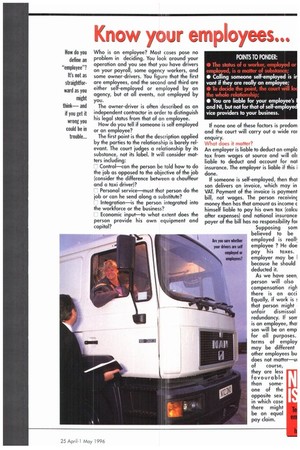Know your empioyees...
Page 61

If you've noticed an error in this article please click here to report it so we can fix it.
Who is an employee? Most cases pose no problem in deciding. You look around your operation and you see that you have drivers on your payroll, some agency workers, and some owner-drivers. You figure that the first are employees, and the second and third are either self-employed or employed by an agency, but at all events, not employed by you.
The owner-driver is often described as an independent contractor in order to distinguish his legal status from that of an employee. How do you tell if someone is self employed or an employee?
The first point is that the description applied by the parties to the relationship is barely relevant. The court judges a relationship by its substance, not its label. it will consider matters including: Control—can the person be told how to do the job as opposed to the objective of the job lconsider the difference between a chauffeur and a taxi driver)?
Personal service—must that person do the job or can he send along a substitute?
Integration—is the person integrated into the workforce or the business?
[ Economic input—to what extent does the person provide his own equipment and capital? if none one of these factors is predom and the court will carry out a wide rat enquiry.
What does it matter?
An employer is liable to deduct an emplo tax from wages at source and will ah liable to deduct and account for nal insurance. The employer is liable if this i done.
If someone is self-employed, then that son delivers an invoice, which may in VAT. Payment of the invoice is payment bill, not wages. The person reteivinc. money then has that amount as income c himself liable to pay his own tax lcalcu after expenses) and national insurance payer of the bill has no responsibility for
Supposing som believed to be employed is real!: employee ? He doe pay his taxes. employer may be I because he should deducted it.
As we have seen, person will also compensation righ there is an acci Equally, if work is that person might unfair dismissal redundancy. If sorr is an employee, thcr son will be an emp for all purposes. terms of employ may be different other employees bu does not matter—ui
of course, they are less favourable than someone of the opposite sex, in which case there might be an equal pay claim.
























































































































